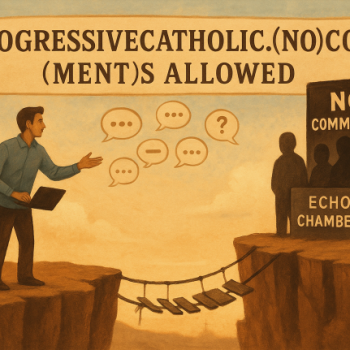GODSTUFF:
GET EM YOUNG: ‘JESUS CAMP’ IS A NIGHTMARE
Do you know where the expression “Out of the mouths of babes . . .” comes from?
I was surprised myself by the answer.
The Bible.
There are two references — one in the Gospel of St. Matthew and the other found in the Book of Psalms, which says, in part, “Out of the mouths of babes and infants you have founded a bulwark because of your foes, to silence the enemy and the avenger.”
Has a different ring to it when you read the expression in context, doesn’t it?
I kept thinking about that expression —Out of the mouths of babes … — as I watched the new documentary film “Jesus Camp” this week.
I did not expect to like “Jesus Camp,” a PG-13 documentary that opened in Chicago last week but that I’ve been hearing about since its debut at the Tribeca Film Festival this past spring.
The film, made by documentarians Heidi Ewing and Rachel Grady, follows several Midwestern children through their experience at a pentecostal Christian Bible camp in (seriously) Devils Lake, N.D., where pre-adolescent kids are trained to be, among other things, soldiers in the Army of Jesus Christ.
The documentary has caused a lot of shrieking and hand-wringing in some circles, mostly among those for whom the word “evangelical” means “complete lunatics who want to turn the United States into a theocracy.”
I figured I’d watch it with a lot of eye-rolling and then write a “lighten-up, Francis” column about how not all evangelicals are alike, that only a few of us are meanspirited, wild-eyed, gun-toting conservatives. I expected the film to be another paint-all-the-Jesus-people-with-the-same-broad-nefarious-brush treatment that has become so popular in recent years.
But as it turned out, I didn’t like the film for an entirely different reason. In fact, the filmmakers, whose last project together was the documentary “The Boys of Baraka” about a group of “at-risk” pre-adolescent boys from Baltimore who attend a school in Kenya for a time, treat their subjects with empathy, nuance and context.
Ewing and Grady don’t skew the film to make the pentecostal Christian kids, parents and pastors in the film look like crazy people. The times when those folks do come across as wackos is not the fault of the filmmakers.
“Jesus Camp” is a thoroughly troubling film that left me shaken, literally. It might be because I recognized myself in the faces of the shaking, weeping, trying-so-hard-to-please-God-and-their-parents children in the film.
Three children who are featured in the film — 9-year-old Rachael, 10-year-old Tory and 12-year-old Levi — are marvelous kids, well-spoken, polite, bright, kind and sooooooo sincere. They say all the things their parents have taught them to believe: that they love the Lord and their country, that they want to act justly, live rightly and walk humbly with their God, that abortion and evolution are wrong, that global warming is a myth.<
Their parents seem like well-meaning, God-fearing people and I’m sure they have their children’s best interests at heart as they subject them to religious and political indoctrination in public and on film. (One has to question the wisdom of allowing your child to be followed by a film crew for any reason, no matter how allegedly noble.)
As I watched sweet home-schooled Tory, who loves to dance and takes private lessons, explain that she has to keep herself in check when she dances to make sure it’s “for the Lord” and not “for the flesh,” my heart broke. The idea that this 10-year-old’s dancing could be anything but full of joy and innocent beauty is so very sad.
She’s trying so hard, crying out to God in prayer, tears streaming down her red face and veins bulging in her slender neck, as she pleads for an end to abortion during one especially animated worship service at camp.
And then there’s earnest, precocious Rachael, the one ho reminds me so much of myself at her age. The scene that really got me took place at a bowling alley where she prays over her ball before sending it pathetically down the lane. “Your spirit, not mine,” Rachael whispers at the too-big red bowling ball in her hands. “Help me to make this one a good one. Ball, I command you in the name of Jesus: Make this one a good hit.”
The ball winds up in the gutter.
In another scene, Rachael, who has a habit of nervously holding her breath as she talks, clearly parroting the lessons about faith and values she’s learned at home and at church, walks up to three older African-American men seated in a park in Washington, D.C., where she has traveled with her parents to take part in an anti-abortion demonstration.
“Hi,” Rachael says, arm semi-outstretched with a Bible tract in hand. “If you died tonight, where do you think you’d go?”
“Heaven,” one of the men says.
“Are you sure?” the little girl prods.
“Yes,” the man says pleasantly.
As she walks away, clearly flummoxed by the encounter, Rachael whispers to the two kids with her, “I think they were Muslims.”
Oy.
After watching “Jesus Camp,” I can’t help but wonder where education ends and indoctrination begins, whether indoctrination can ever be a benign thing, and what, exactly, constitutes spiritual abuse.
I can’t imagine a situation in which I would feel it was OK to subject my young child to a worship experience so emotionally charged that she is encouraged to scream out, bawl and shake, to confess her laundry list of egregious sins and beg God’s forgiveness as the pastor shouts, “We don’t have any phonies in the army of God!”
The army language doesn’t bother me. There’s a lot of history and, frankly, biblical imagery to back that up. It’s the emotional manipulation of children in the name of God that turned my stomach. I’m sorry, but that just seems emotionally violent and spiritually reckless.
Spiritual abuse leaves debilitating scars, even if you can’t see them. There’s more than one way to walk through this life with a limp.
In “Jesus Camp,” the pastor, Becky Fischer, who seems like a well-meaning, funny, warm woman genuinely devoted to her ministry, talks about the importance of indoctrinating children in order to change our “sick” world, which is going to hell in a handbasket.
Explaining how important it is to “get ’em young,” Fischer, who tells her young disciples that the “warlock” Harry Potter is “an enemy of God,” says, “I want to see these kids laying down their lives for the Gospel in the same way fundamentalist Muslims do.”
Children aren’t warriors. They’re children. Let them have their few innocent years before sending them off to battle, please. Their parents can do the fighting until they’re old enough to decide whether to enlist or conscientiously object.
When we start treating anyone — children, adults, friends, enemies — as commodities to be “gotten,” beaten or won, we’re no longer on sacred ground.
We’re in dangerous territory.















